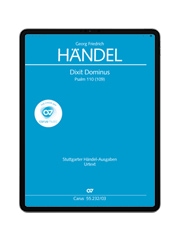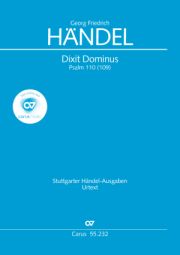A Variety of Voice Combinations
Every month a member of the Carus team introduces his or her favorite work, whether it be a choral piece, a CD, a songbook or an instrumental work. The recommendation for September 2018 was contributed by deputy chief editor Julia Rosemeyer.
For our chamber choir’s anniversary concert this year, we treated ourselves to a program with orchestra – G.F. Handel’s Dixit Dominus and the Nelson Mass by Joseph Haydn. My enthusiasm for the young Handel’s psalm setting was quickly ignited. The alto begins: “Dixit, dixit Dominus Domino meo.” What at first seems like an insuperable tongue-twister of rapidly ensuing syllables soon acquires an incomparable charm, and you realize that is exactly how it has to be. Each motif is derived from the text, each syllable sits in the correct place. The frequent text repetitions – around 30 minutes of music are created from around a dozen verses of text – divide the psalm in formal terms into its different sections. Whilst I previously found the rather martial text difficult to approach, I now appreciate the quality in the setting of powerful words such as “confregit” or “conquassabit”.
What I particularly like about Handel’s music is the variety of voice combinations in the contrapuntal passages, the ever-present rhythm, and the part-writing, which is never ungrateful even for the middle voices. Once all the hemiolas have been identified and the themes learnt perfectly, the formal structure almost reveals itself. For me, one of the key moments in this regard was the double fugue “Tu es sacerdos in aeternum / secundum ordinem Melchisedech”. One of my favorite passages is the direct force of the homophonic choral entry in “Juravit Dominus”, and the soprano duet accompanied just by male voice chorus “De torrente in via bibet”, where the dissonant suspensions are enjoyed to the full.
For practising I did not trust my pianistic abilities at first, and came to appreciate the advantages of a digital practice aid (the slow mode is a ‘must’ in view of the fast tempi throughout).
I find that favorite pieces always depend a bit on the particular moment, but for the time being I have found mine!
Julia Rosemeyer has been an editor at Carus-Verlag since 2006, with particular responsibility for critical editions. In her free time, the deputy chief editor is a keen a cappella singer, and enjoys performing works by Brahms, Reger, Monteverdi, and contemporary composers.






Leave a Reply
Want to join the discussion?Feel free to contribute!